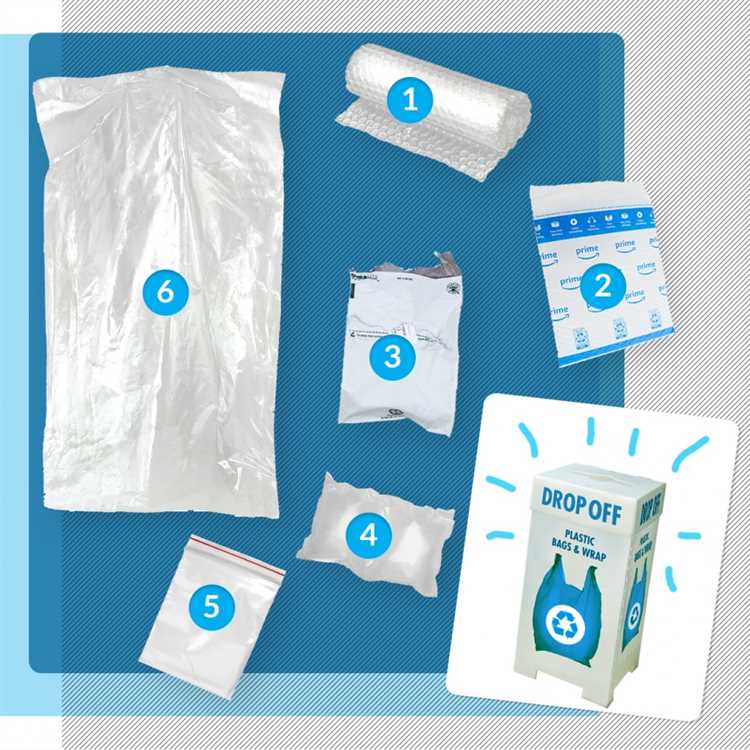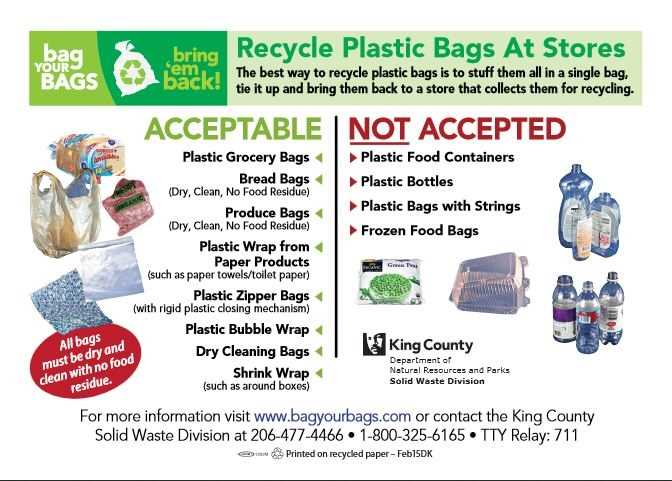Plastic shipping bags are a common sight in our daily lives, whether we receive packages from online retailers or get groceries from the store. But what should we do with these bags once we no longer need them? Can they be recycled, or will they end up in a landfill?
Recycling plastic shipping bags is indeed possible, but it requires some extra effort on our part. Most curbside recycling programs do not accept these bags because they can cause damage to the recycling equipment. However, many grocery stores and retailers have special bins where you can drop off your used plastic bags for recycling.
Why should we bother recycling plastic shipping bags?
The answer lies in the environmental impact of these bags. Plastic, as we know, is not biodegradable and can take hundreds of years to decompose. When plastic bags end up in landfills, they contribute to the already staggering amount of waste that is piling up on our planet. Recycling these bags not only reduces the amount of waste going to landfills but also conserves energy and resources used in the production of new plastic.
So, how can we make sure our plastic shipping bags actually get recycled?
First, we should check with our local grocery stores or retailers to find out if they accept plastic bag recycling. If they do, we can simply collect our used bags, make sure they are clean and dry (moisture can affect the recycling process), and drop them off in the designated bins. These bags are typically recycled into plastic lumber, outdoor furniture, or new plastic bags.
For those who don’t have access to plastic bag recycling programs, there are alternatives. Plastic shipping bags can be reused as trash can liners, to collect and store recyclable materials, or even donated to local charities or food banks.
In conclusion, recycling plastic shipping bags is an important step we can take to reduce waste, conserve resources, and minimize the environmental impact of these ubiquitous items. By being mindful of our options and making an effort to recycle or reuse these bags, we can contribute to a more sustainable future.
- The Environmental Impact of Plastic Shipping Bags
- Pollution of land and water
- Energy consumption and greenhouse gas emissions
- Recycling Options for Plastic Shipping Bags
- Reusing Plastic Shipping Bags
- Ways to Reuse Plastic Shipping Bags
- Alternative Uses for Plastic Shipping Bags
- 1. Trash Bags
- 2. Storage and Organization
- 3. Pet Waste Bags
- 4. Packing Material
- Q&A:
- Can plastic shipping bags be recycled?
- What can I do with the plastic shipping bags if there are no recycling bins near me?
- Why are plastic shipping bags difficult to recycle?
- What are the environmental impacts of plastic shipping bags?
The Environmental Impact of Plastic Shipping Bags

Plastic shipping bags have become a popular choice for packaging due to their lightweight and durable nature. However, their convenience comes at a significant environmental cost. The production and disposal of plastic shipping bags contribute to various negative impacts on our ecosystems and natural resources.
Pollution of land and water
One of the most harmful environmental effects of plastic shipping bags is their contribution to land and water pollution. When these bags are not properly disposed of, they can end up in rivers, lakes, and oceans, posing a serious threat to marine life. Marine animals often mistake plastic bags for food, leading to ingestion and entanglement, which can result in injury or death.
Plastic shipping bags that end up in landfills also present a problem. They do not decompose easily and can persist in the environment for hundreds of years. As they break down into microplastics, they can contaminate soil and groundwater, causing further harm to the ecosystem.
Energy consumption and greenhouse gas emissions
The production of plastic shipping bags requires significant amounts of energy and resources. The extraction of fossil fuels, such as oil and natural gas, used in the manufacturing process contributes to greenhouse gas emissions and climate change. Additionally, the transportation and distribution of these bags also require energy, further increasing their carbon footprint.
Inefficient recycling practices further exacerbate the environmental impact of plastic shipping bags. Many bags end up in the trash or are improperly recycled, leading to wasted resources and increased pollution.
Given the significant environmental consequences of plastic shipping bags, it is crucial to explore sustainable alternatives and promote responsible consumption and disposal practices. This can include using reusable bags, opting for paper or biodegradable packaging materials, and properly recycling plastic bags to minimize their impact on the environment.
Recycling Options for Plastic Shipping Bags
When it comes to plastic shipping bags, recycling is an important step towards reducing their impact on the environment. Although not all recycling facilities accept plastic bags, there are still several options available for proper disposal and recycling.
1. Store Drop-Off: Many grocery stores and retailers have dedicated drop-off points where you can bring your plastic shipping bags for recycling. These collection points are usually located near the entrance of the store, making it convenient for customers to recycle their bags while shopping. Simply gather your bags and drop them off in the designated bins.
2. Recycling Programs: Some cities and municipalities offer curbside recycling programs that accept plastic shipping bags. Check with your local waste management department or visit their website to find out if plastic bags are accepted and if there are any specific guidelines for recycling them. Be sure to separate the bags from other recyclables and follow any instructions provided.
3. Mail-Back Programs: Several organizations and companies offer mail-back programs for plastic shipping bags. These programs allow you to mail your bags to a designated recycling facility using pre-paid shipping labels. Simply collect your bags, package them securely, and send them off in the mail. Keep in mind that there may be certain requirements or restrictions for participation in these programs, so be sure to check the details before sending your bags.
4. Plastic Film Recycling Centers: Some recycling centers specialize in plastic film recycling, which includes plastic shipping bags. These centers have the necessary machinery and processes to effectively recycle plastic bags into new products. Check for plastic film recycling centers in your area and inquire about their acceptance criteria and drop-off locations.
| Recycling Option | Benefits |
|---|---|
| Store Drop-Off | – Convenient – Supports local recycling efforts |
| Curbside Recycling Programs | – Easy disposal – Includes plastic bags in regular recycling routine |
| Mail-Back Programs | – Can be done from home – No need to find a drop-off location |
| Plastic Film Recycling Centers | – Specialized facilities for efficient recycling – Maximizes recycling potential |
Remember, recycling is just one part of the solution. It’s also important to reduce the use of plastic shipping bags whenever possible. Consider using reusable bags or opting for eco-friendly packaging materials to further minimize your environmental footprint.
Reusing Plastic Shipping Bags

While recycling is an important option for dealing with plastic shipping bags, reusing them can be an even better solution. Reusing bags not only reduces waste but also saves resources and energy that would be required to produce new bags.
Ways to Reuse Plastic Shipping Bags
Here are several creative ways to reuse plastic shipping bags:
- Storage: Plastic shipping bags can be used for storing various items around the house, such as clothes, shoes, and toys. They can also be used as packaging materials for fragile items when moving or shipping.
- Grocery bags: Take your plastic shipping bags to the grocery store and use them instead of single-use plastic bags. This helps to reduce the amount of disposable plastic bags that end up in landfills.
- Pet waste: Plastic shipping bags can be repurposed as dog poop bags. They are convenient for picking up pet waste during walks and can help keep public spaces clean.
- DIY crafts: Plastic shipping bags can be transformed into various creative crafts, such as woven rugs, crocheted mats, or even reusable tote bags. Get creative and turn these bags into useful and unique items.
Remember, reusing plastic shipping bags can extend their lifespan and reduce environmental impact. However, it’s important to only reuse bags that are still in good condition. If a bag is torn or damaged, it’s best to recycle it appropriately.
By finding ways to reuse plastic shipping bags, we can minimize waste and contribute to a more sustainable future.
Alternative Uses for Plastic Shipping Bags
While recycling is the most environmentally friendly option for dealing with plastic shipping bags, there are also a variety of alternative uses for them before they eventually end up in a landfill. Here are a few creative ideas:
1. Trash Bags
Plastic shipping bags can be repurposed as small trash bags, especially for use in the bathroom or home office. Simply place one in a small wastebasket and empty it regularly to prevent odors or spills.
2. Storage and Organization

Plastic shipping bags can also be used for storage and organization purposes. They can be a convenient way to store small items or separate different types of items within a larger storage container. For example, you can use them to keep socks together, store cables and cords, or keep craft supplies sorted.
Additionally, plastic shipping bags can be used to protect delicate or fragile items when storing or moving. Simply wrap the items in the bags to provide an extra layer of protection.
Caution: Be careful when using plastic bags to store items that could be damaged or discolored by plastic. Make sure to monitor the condition of items stored in plastic bags over time to avoid any potential issues.
3. Pet Waste Bags

If you have pets, plastic shipping bags can come in handy as makeshift pet waste bags. When walking your dog, you can reuse a bag to pick up their waste and dispose of it properly. This helps to reduce the need for single-use plastic bags specifically designed for this purpose.
4. Packing Material
Plastic shipping bags can be used as cushioning material when packing fragile items for shipping or moving. They can help protect delicate items from bumps and shocks during transportation. Simply crumple up the bags and place them around the item to provide an extra layer of protection.
Note: It’s important to remember that these alternative uses should be considered temporary solutions. Whenever possible, it is still best to reduce plastic waste and recycle the bags appropriately.
By exploring alternative uses for plastic shipping bags, you can extend their lifespan and reduce waste. However, it’s important to prioritize recycling whenever possible to minimize the impact on the environment.
Q&A:
Can plastic shipping bags be recycled?
Yes, plastic shipping bags can be recycled. Many grocery stores and retail stores have drop-off bins where you can bring your used plastic bags for recycling.
What can I do with the plastic shipping bags if there are no recycling bins near me?
If there are no recycling bins near you, you can reuse the bags for other purposes, such as storing items or lining trash cans. Another option is to mail the bags back to the manufacturer for recycling.
Why are plastic shipping bags difficult to recycle?
Plastic shipping bags are difficult to recycle because they are made from a type of plastic called low-density polyethylene (LDPE), which requires a different recycling process than other types of plastic. Additionally, many recycling facilities do not have the capability to separate the bags from other recyclables.
What are the environmental impacts of plastic shipping bags?
Plastic shipping bags have several negative environmental impacts. They contribute to pollution and litter when not properly disposed of, and can harm wildlife if ingested. Additionally, the production of plastic bags results in the consumption of fossil fuels and the release of greenhouse gases.